S: Today I’m speaking with Juradaa, Herald of Communications for the people of the Tai-ii-katch system of worlds. Herald Juradaa is speaking to us from a space station orbiting planet 9-6.
S: Herald Juradaa, thank you so much for talking with us today.
J: You are welcome.
S: First, I want to ask about your world, or worlds. I gather your people have spread to many other planets from your home world. Is that correct?
J: Yes. We control a region encompassing twelve stars surrounding our home star of Selada. Our home planet was originally called Nantra, but it is now designated as 1-4, first sun, fourth planet out. We still refer to ourselves as nantrans, however.
S: Do some of your people still live on 1-4?
J: Probably a few thousand maintenance workers. There are few mineral resources left, but some salt water.
 S: It sounds like you pretty much stripped your home world. How livable is it?
S: It sounds like you pretty much stripped your home world. How livable is it?
J: The workers there live in enclosed habitats where it is quite comfortable. Much of the labor is mechanized, of course, but sometimes requires maintenance. We also raise herds of binox, kerps and anjas, some of our food animals.
S: The animals can tolerate the atmosphere?
J: There are some areas on some planets where the air and soil are less contaminated, and animals can be raised outside. The majority are raised inside habitats. We’ve developed complexes of living quarters, agricultural areas, and service areas connected by transportation systems. Though the atmosphere on our planets is not pleasant, inside it’s quite comfortable. My people have been living in controlled environments for almost a hundred generations.
S: Where do you live? On one of the other planets?
J: No, my family lives in an orbital colony at 6-3.
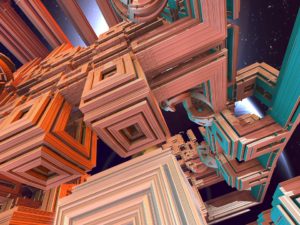 S: An orbital colony—like a space station?
S: An orbital colony—like a space station?
J: (He’s laughing). Not anything like the Earth station I’ve seen images of. Ours is the size of a small moon.
S: Wow. How long have you lived there?
J: For the past ten standard cycles. Since our empire encompasses many stars and planets, we’ve developed a standardized time-frame for life on the station. It is used by everyone in the empire for general communications, although for harvesting and other jobs that are specific to a particular planet or moon, the workers sometimes use a localized frame of reference.
S: I see. But doesn’t that much time in space have detrimental physical effects.
J: No. Our bodies have adapted over time, and our stations have gravity and clean atmosphere. Much more livable than a planet. This is a picture of one of our agrarian centers. 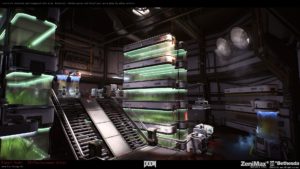
S: So, did you grow up in a space colony?
J: Yes. Almost all of us do. The few who are working on planets are normally stationed there for one or two tours of duty at a time, though some individuals seem to prefer smaller communities and choose to stay on planets for most of their lives.
S: Our astronauts who remain on our space station for extended periods of time have a difficult time adjusting to Earth gravity when they return. But we don’t have artificial gravity. Is that a technology you might be willing to share with us?
J: That’s a possibility. It is something you will have to develop if you intend to do any long-term space exploration. From what I have seen, your race is only in the earliest stage of that.
S: That’s true. We haven’t even settled another planet in our own solar system yet, though that is expected to happen within a couple of decades. Artificial gravity and faster propulsion would help a lot.
J: We will have to see what you can offer in trade.
S: Tell me about life on a space station. What do people do for fun?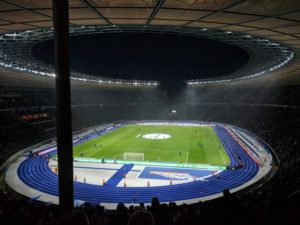
J: We enjoy sports, theater, socializing with extended family and friends. This is one of our arenas. Seven different sports can be played here. My favorite is one called gumbat. Two teams of twelve people each compete to put flying batties into the scoring window. A battie looks like a ring, fatter in the middle where a power mechanism allows it to fly. There are three attackers controlling batties and nine defenders on each team. The defenders try to shoot down the batties before they enter the window, which is only slightly bigger than the battie. We also have races and competitions on the track around the outside, both among individuals and races on a vehicle called a darter. It has wheels, but can fly as well as scoot on the ground. We also enjoy a lot of competitions of physical strength and ingenuity. Our arenas can simulate a number of different conditions, fire, ice, water, and we have some designed for underwater and plasma competitions.
S: Plasma?
J: Yes—a viscous fluid—it requires a special suit and is difficult to move through—very challenging.
S: What are your living quarters like?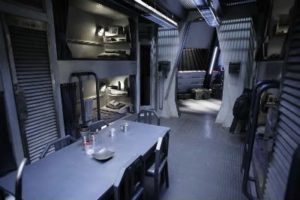
J: This is my home. Several adults live together and share areas like the kitchen. We have a common recreation area where we can watch the vendeer—similar to what you would call television, but we also can access that from our private sleeping quarters. We have a constant flow of information and entertainment.
This area is one of the work stations where we process minerals and other resources mined from the planets. Our space colonies require a broad range of metals. We also extract elements that are used as fertilizer for plants and food for some of the organisms raised on board.
S: Do you ever get tired of small, enclosed spaces, ever get the urge to enjoy wide open spaces and fresh air?
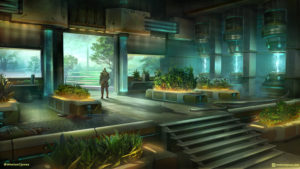 J: I find the air in the colony far fresher than what I’ve encountered on planetary surfaces. The atmosphere on a planet is difficult to control over a broad area. It becomes contaminated with dirt, dust, air-borne microbes. I usually wear a filtration device when I’m outside one of our habitats. Our homes are beautiful and very comfortable.
J: I find the air in the colony far fresher than what I’ve encountered on planetary surfaces. The atmosphere on a planet is difficult to control over a broad area. It becomes contaminated with dirt, dust, air-borne microbes. I usually wear a filtration device when I’m outside one of our habitats. Our homes are beautiful and very comfortable.
S: Your experience makes me appreciate our own planet all the more.
J: I’ve seen visuals of your planet. You haven’t yet done as much environmental damage as we did to our home world, but you’ll have to change many of your procedures soon, or you will end up as we have. Though, to be honest, I am happy with my life here, and I’ve met only a few who would choose a different life. Some of our people have relocated outside our empire to planets with whom we trade.
S: Interesting. It’s good to have choices.
J: Indeed.
Readers, join me again next week as I continue the interview with Juradaa. There’s a lot more of interest to come.
